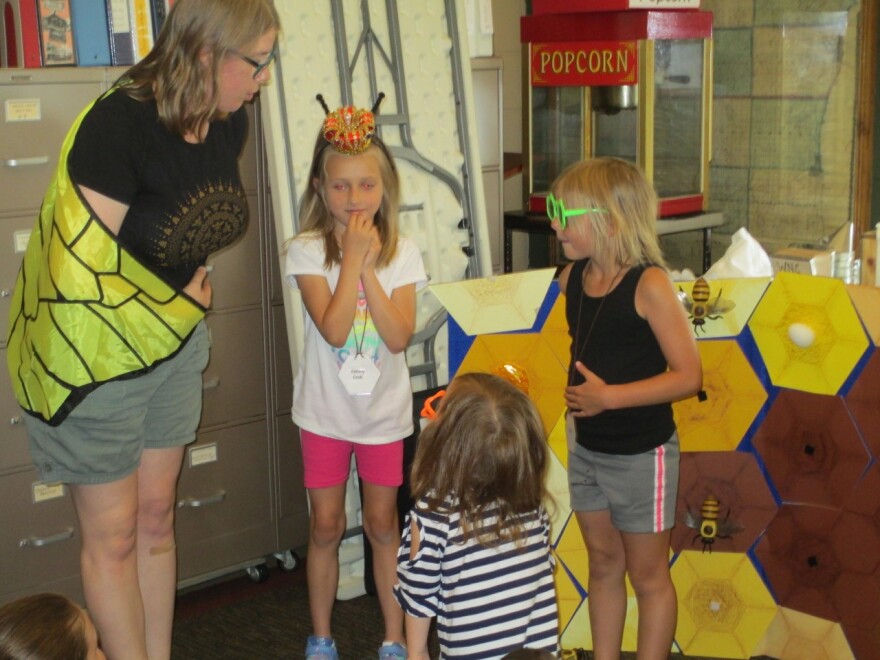Beginning Friday afternoon in a forested area of Franklin, Wisconsin, scientists will begin a 24-hour search for every type of plant, insect and animal they can find.
It’s called a BioBlitz.
All it takes is meeting a few event organizers and it’s clear — the importance of preserving the “natural” in our world while inspiring the next generation to pick up the case run deep in the event.

Two days before the event kicked off, Julia Colby sat under a tent outside Wehr Nature Center, busily tapping on her laptop keyboard.
“We had two birders out this morning. I was just transcribing their lists when you came up,” she says.
Colby is coordinating the BioBlitz. Her full-time job is zoology collections manager at the Milwaukee Public Museum.
Most of the 70 scientists will arrive with their microscopes, nets and traps Friday afternoon, but Colby says a few opted to contribute their expertise and skip the togetherness part.

“Some folks wanted to survey but weren’t comfortable with the whole group. We have two botanists out right now,” Colby says.
The museum staged its first BioBlitz in 2015 at Schlitz Audubon Nature Center in Bayside.
READ Milwaukee's First BioBlitz Uncovers Species At Schlitz Audubon Nature Center
“Our mission is to educate and engage and inspire people about the natural world. This is a natural extension of that. It’s a great opportunity to be out in the field and to show people what’s out there and what they can do,” Colby adds, “It’s as important as seeing a diorama of a beaver dam or of the Horicon Marsh.”
Each year since, organizers moved their tents and clipboards to another natural area — one year to Madison, another to Waukesha County.
Last year, Colby says the “blitz” was scheduled to take place here at the Wehr Nature Center, along with adjacent Whitnall Park — minus its botanical gardens — and the Root River Parkway, which totals about 1,000 acres.
The pandemic dashed the 2020 plan, and as June 2021 weekend approached, Colby says, “We were unsure the whole thing would happen this year until recently.”

But when the 2021 BioBlitz got the green light, people like Emilie Burmeister with Milwaukee County Parks were ready to pitch in and make it happen.
The BioBlitz will survey a smidge of the county’s 10,000 natural acres that Burmeister and a small team steward.
But the information scientists uncover over 24 hours can help her team fine-tune habitat restoration efforts, and could, Burmeister hopes, inspire more volunteers to roll up their sleeves to help with ongoing monitoring she coordinates.
“We’re promoting our wetland monitoring, bumblebee monitoring,” Burmeister explains.
While she focuses on volunteer recruitment, Burmeister’s summer interns will be out assisting scientists in the field.
“Young conservationists on our staff could not be more excited to help collect data and meet different researchers from all over the state —whether it’s bats or moths or bumblebees.” She adds, “And again that data as land managers for Milwaukee County is going to help us for a very long time."
While scientists and eager interns are mucking around for elusive species, visitors can jump into educational activities. It’s not the “chocked full of hands-on options” Wehr Nature Center naturalist Brooke Gilley had in mind.
“Such as a kids’ bird banding activity. We were going to have them doing activities that correlate with what the surveyors and scientists do out in the field. To say, 'Hey, you could be the next ornithologist who studies bird or an entomologist — the study of insects,'” she explains.

Gilley scaled back. There will be fewer activities and fewer people per activity, but she is no less excited.
"We’re doing a bat night, we have a bumblebee hike to get to know your native bees and bumblebees. Families can use real binoculars and a field guide and check out our birds," she explains.
It’s no secret, Gilley’s personal 24-hour BioBlitz goal is to inspire kids. She knows, and wants to share, the feeling of being inspired by nature.
READ What's So Great About Moths? Schllitz Audubon Has The Answer
Gilley started volunteering at Wehr Nature Center when she was 11 years old. “And then I think I was 13 when I started playing the great horned owl for our Halloween haunts, sitting up in a tree stand, hooting and doing a little spiel,” she recalls.
Years later, after jobs in Minnesota and Kentucky and earning a Masters, Gilley returned as a Wehr staff member.
So yeah, Gilley’s pretty excited about the BioBlitz. “The BioBlitz is one way to see what the scientists are doing and to get an idea of what’s possible,” she says.
Have an environmental question you'd like WUWM's Susan Bence to investigate? Submit below.
_




